It is a public holiday in Australia today celebrating our national day - the day…
Participation in our MMTed edX MOOC – gender, education and geographic breakdown
Today’s blog post is a little different. Yesterday, the second running of our MMTed edX MOOC – Modern Monetary Theory: Economics for the 21st Century – came to an end after running for the last 4-weeks. This is a free course developed by the University of Newcastle and – MMTed – which provides an introduction to Modern Monetary Theory (MMT). The course is self-paced and contains a range of learning materials (videos, text, discussion forums, assignments, exercises, games, etc). After two years of offering, I thought you might like to see some statistics that relate to who participated in the course broken down by gender, educational background and geography. I have more data than I present today which I am examining as a way of understanding patterns of behaviour. We will use this data to improve our MMTed course offerings, as our funding base permits.
A course summary
The – edX page – for the 2022 course (enrolments now closed) provides an overview of the study program.
At the outset, when we were designing the course, I had no preconceptions as to who would be interested in it.
One of our aims in the course was to help participants access the world of macroeconomics in a way that builds their confidence, their economic literacy, and above all, gets them thinking about how it impacts on the world we live in.
The course started with the basics in Week 1. We pulled apart some of the jargon and concepts in macroeconomics, which often become barriers that prevent the lay person from engaging with economic issues.
We aimed to empower participants to move beyond these ‘language’ challenge so that they would be in a better position to translate the macroeconomic terminology that they are confronted with on a daily basis in the media and engage in meaningful conversations about economics with others and be able to better assess the sorts of statements that economists and politicians make about economic policy options.
The difficulty was that there is no way I can squish everything I’d like students to know about macroeconomics and MMT into a 4-week course. I also didn’t want to end up with a course that only appealed to economists.
So, the compromise is a course that starts at street level and then shows students the best views in the building without going into fine detail on each topic.
There are many topics that I only discussed in passing because they are more complex and require more time and input.
But, overall, if a student completed the course, then they would have a broad and rounded understanding of what MMT is and how it dramatically changes the game in terms of economic thinking about the options available to government to improve the well-being of all citizens while protecting our natural environment.
In Week 1 we aimed to improve economic literacy by cutting through the jargon that makes relatively simple concepts difficult for the general public to engage with. The exciting bits came in later weeks but we considered learning to walk before we run is essential for good running form.
In Week 2, we learned about how historical events led to fundamental shifts in the way governments could use their currency, which provides the foundations of MMT. We built on the concepts learned and there was even a game show. We provided students with a firm understanding of what causes mass unemployment.
In Week 3, the topics became more complex and we talked in more detail about fiscal and monetary policy, banks, interest rates, inflation and showed what governments can actually do bout unemployment if they want to.
In the final Week, we focused in on trade, economic development, global capital flows, debates about foreign ownership and financial speculation and students learned why an MMT understanding is crucial for addressing the profound problems of the ageing society and climate change.
In each Week, we provided interviews with MMT experts to guide understanding of selected topics.
Some data about the participants – Gender
edX collects a lot of data about the courses they offer on behalf of university providers.
Here is some interesting data that allows us to make various conjectures.
First, what is the gender breakdown of participants – female, male, other (which are the edX categories).
The following graph shows the gender proportions of those who disclosed their gender.
In 2021, 56.8 per cent of the class did not disclose their gender.
In 2022, 33 per cent of the class did not disclose their gender.
Of those who did, the following graph shows the distribution.
- 20.68 per cent were female in 2021, and 20.03 per cent in 2022.
- 78.14 per cent males in 2021, 77.95 per cent in 2022.
- 1.18 per cent other in 2021, 2.03 per cent in 2022.
So, for whatever reason, the course in both years was dominated by male participants.
Why? We are wondering. Comments welcome.
The next graph shows the trajectory of enrolments in absolute numbers (suppressed) by gender (female and male) in 2021 and 2022, for 87 days after the enrolments opened.
The courses ran for 4 calendar weeks but opened earlier.
The behaviour of females is similar in both years, whereas males were much earlier to enrol in 2022 relative to 2021.
The class was 1/3 the size in 2022 relative to 2021 (which had in excess of 3600 students).
Some data about the participants – Educational background
Another interesting snapshot is provided by the data on educational background.
The following graph shows the breakdown of enrolments (in proportions) for 2021 and 2022.
- In 2022, 13.4 per cent of participants has a High School Diploma or less (15.1 per cent in 2021).
- 40.7 per cent had a university degree (40.41 per cent in 2021).
- 44.4 per cent had an advanced university degree (42.9 per cent in 2021).
So, not unsurprisingly, those with more tertiary education are participating in these MOOCs, which is a little disappointing.
What about geographical spread of participants?
Over the two years of running the course (so far), students from 135 nations have participated (where they have identified their nation).
The following Tables show the proportions of national enrolments for 2021 and 2022.
A blank element in 2021 means there were no students, while an n/a in 2022 means the same thing for that year.
And here are two maps of the enrolments from 2021 (first) then 2022 to follow.
Conclusion
And for the students, thanks for enrolling. As promised the review of the quizzes conducted during the course will appear over the next four weeks of my Weekend Quiz, starting this week.
Any comments are welcome.
I am sure a marketing expert will be able to tell me things about this data.
That is enough for today!
(c) Copyright 2022 William Mitchell. All Rights Reserved.
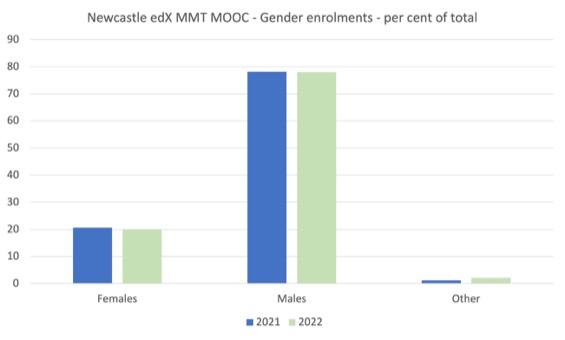
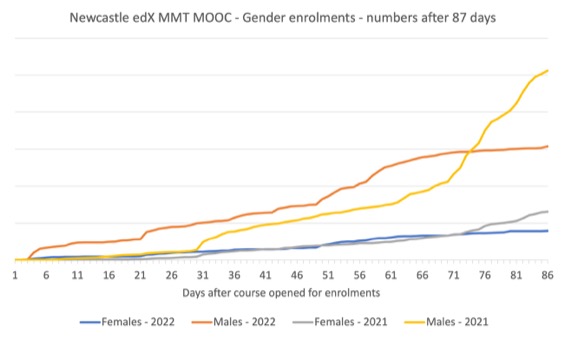
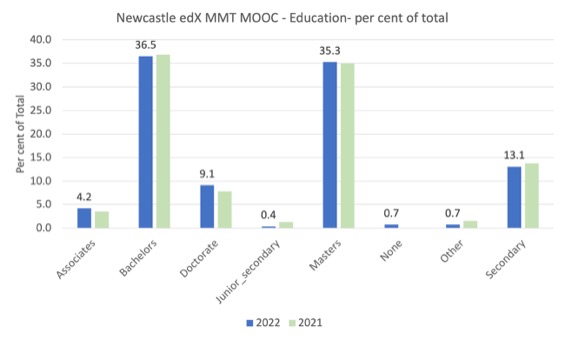
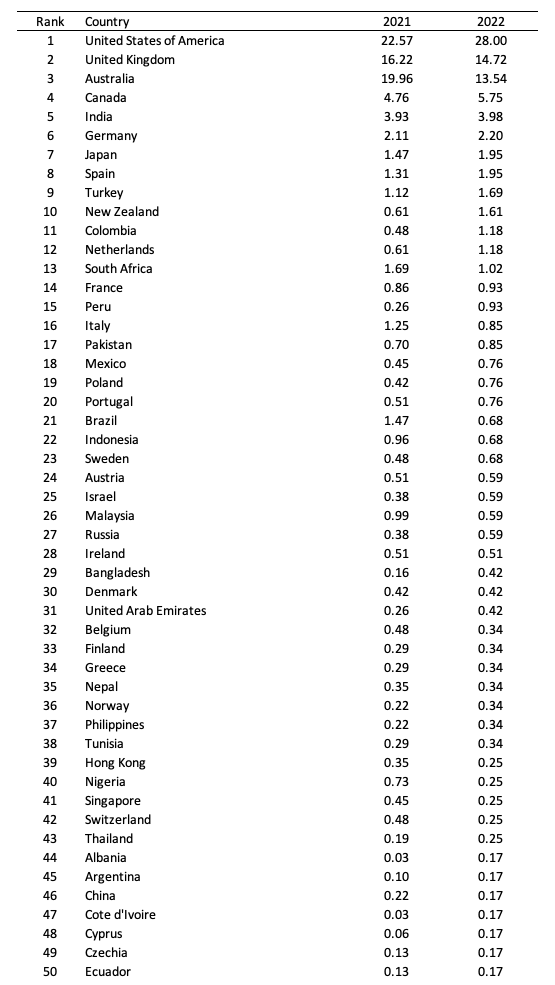
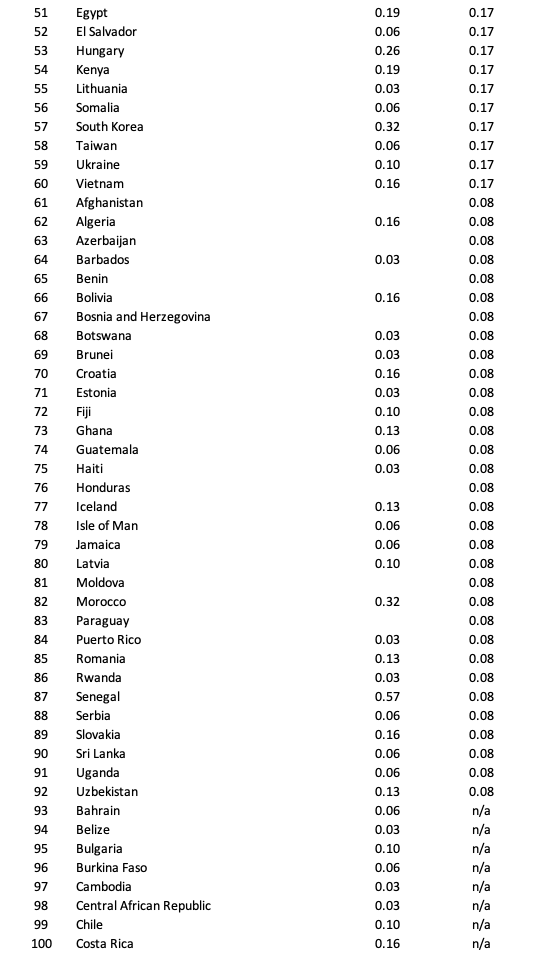
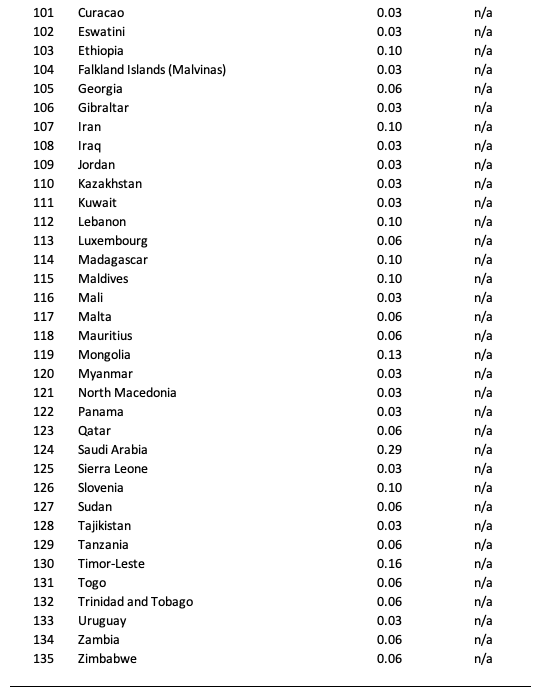
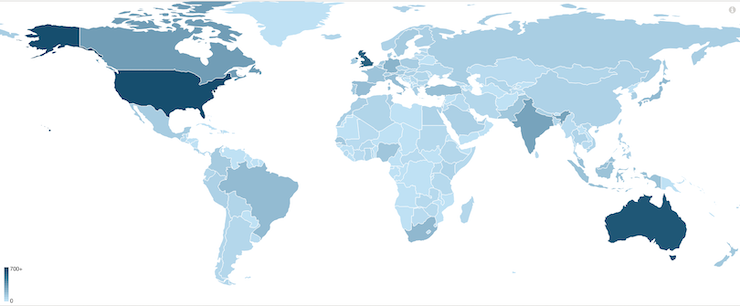
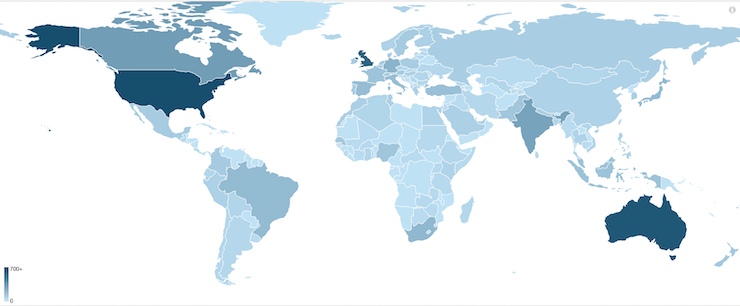
The gender gap in enrollment is puzzling but I have experienced the same issue in activities we organize in Spain. I think that one clue might lie in the confrontational nature of the Economics. If you are a proponent of MMT you are going to be the victim of permanent bashing from mainstream economists. Perhaps women are not willing to engage in an activity that will include permanent male aggression. Another clue could be that women have less time for activities such as an online course because they are being bogged down by house chores and dedicating more time to taking care of dependent children and elderly.
We made efforts to attract more women to our activities to little or no avail. It is a shame.
“Perhaps women are not willing to engage in an activity that will include permanent male aggression.”
Catch 22 where is the aggression coming from child rearing? I’d like to think not!
maybe MMT has more similarities than differences with conventional economics https://www.bbc.com/news/business-41571333
Hi Bill.
I am fortunate enough to have studied economics at university. Well to my 2nd year, the university went bankrupt and other unis told me I had to start again, but getting the funding was a no go.
Anyway, I am part of a large Sri Lankan community, and there are only a couple of women that will engage in economics and current affairs. That isn’t to say all the men participate. Interestingly the men prefer statistics, and the ladies prefer, like I do, the more intricate and human side of economics. Just last night, one of the ladies came to my house to visit my in laws, and she asked me about Ukraine.
However, my experience with men is a lot more different. I find with them that class and “credentials” matter when a person speaks. They are polite enough, but, I get a sense of, that they don’t think I know anything. Also they like to use all the economic jargon. This makes me wonder about their genuine interest in economics. One thing I know, is some of them really dislike the idea of someone without class and credentials knowing more about economics than they do.
Typing this made me think all of the sudden, perhaps this might be a reason for some women having little interest. The typical notion of economics is less about society, and more about the “science”. Also without a degree/credentials, engaging with others that do, can be a frustrating if they display snobbery. Even more so when the human side of economic policy, such as austerity is not valued in some circles.
This is just my experience, it might not resonate with others at all.
In the UK the majority of economists on news programmes are women, and have been for some time, I think. They speak textbook economics like their male counterparts.
I have failed to get the youngest woman economist I know to ‘speak MMT’. I doubt she reads this blog, although I’ve pointed her to it. She should at least have read Stephanie Kelton. I think I’ll ring her up and just ask.
Actually I only know one woman with an econ degree who, I think, gets it. When I wrote an article for the Morning Star on UBI 5 years ago I used what she had written about the Job Guarantee (without understanding MMT at all). But she has never shown any interest on Facebook, which is the only way I communicate with her.
The only Facebook friends who like/share my MMT comments are males.
Just taking the opportunity to boast of this, 2nd letter on MMT published in FT today!
Could Andrew Law, head of Caxton Associates, one of the world’s oldest and biggest macro hedge funds (Report, March 7) explain why the UK government needs to borrow its own money, no matter how low the cost, in order to “fund targeted projects that stimulate productivity and growth”.
The government creates money by instructing the central bank to credit private bank accounts. Its only constraint is the real resources available for it to purchase. The resource required for investment in “skills and education” is labour. All government has to do is offer the right price.
Is Law frightened of the consequences for the ruling party if Labour were to dispel the deficit myth, as explained in Stephanie Kelton’s bestseller?
The next Labour party manifesto could include all the promises made in 2019, and more, with its knowledge of the power of the public purse.
It would not surprise me that some people have caught on that not revealing personal details – such as gender – has a lower chance of avoiding bad outcomes, especially women in men lead professions. Or that going with the mainstream and not raising waves is a safer path.
Not to imply anything about any particular event or person, it’s just a sad part of our world.
I taught 2nd and 3rd year macroeconomics 20 years ago with a bit of MMT thrown into the mix.
Most people don’t care for MMT because their main goal at University is to move into a good paying job with the least amount of effort/fuss.
You simply can’t do that if you criticise the ruling ideology with MMT.
Much easier to just go with the flow and make a living.
To do so with MMT you need to be nothing short of brilliant.
Not so sure about your assertion, Alan. I have worked in the investment management industry for nearly four decades. It is a highly competitive field. You are only as valuable as your last investment strategy recommendation (marginalist skool, I know).
I was engaging with and learning from MMT economists like Mosler, Wray, Kelton by the mid 90s. I am very, very short of brilliant (Williams College was gracious enough to let me in despite my not meeting their official 1400 SAT score floor criteria, prolly cuz ’70s stagflation had ravished their budget), but found that by using and developing MMT perspectives, I had an unquestionable competitive advantage over my competitors. Yes, I have had to be crafty and diplomatic, and yes, I was once labeled as “fringy” by a washed up research director (it was 1999 or 2000, and the firm was banking on no bust in the dotcom bubble, as I had warned), but it was and is possible to master MMT analysis and use those insights to achieve a competitive advantage, at least in some finance sector areas.